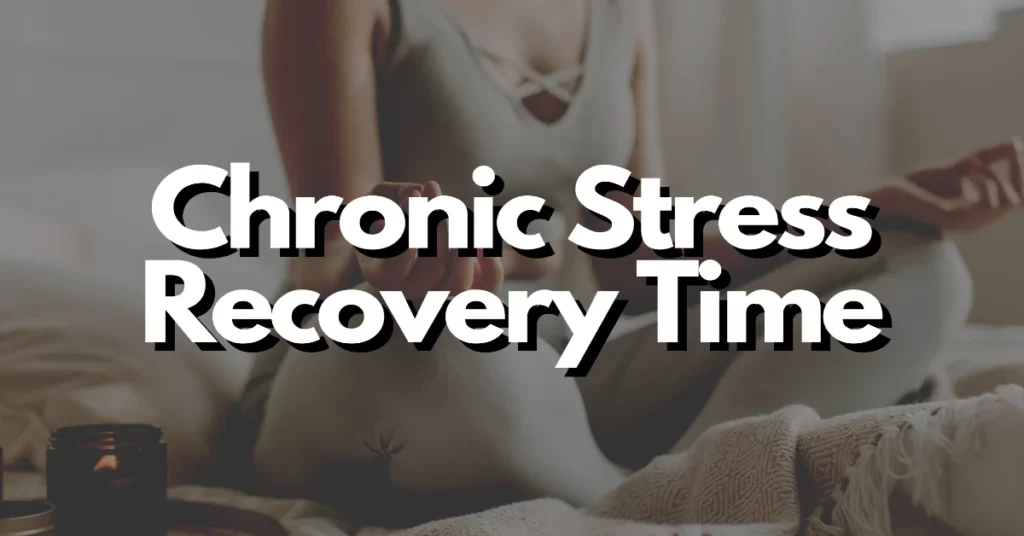Chronic stress is a prevalent issue in our modern lives, and its impact on our physical and mental well-being cannot be overstated. However, understanding the timeline for recovery from chronic stress is essential for effective management and long-term well-being.
In this blog post, we will explore the concept of chronic stress recovery time, considering factors such as individual resilience, coping strategies, and the complexity of chronic stress itself. By gaining insights into the recovery process, you can navigate chronic stress more effectively and cultivate resilience and well-being.

Table of Contents
The Physiology of Chronic Stress and its Prolonged Effects on the Body:
Chronic stress can take a toll on the body and disrupt hormonal balance. When faced with stress, the body releases stress hormones such as cortisol and adrenaline. In the short term, these hormones help the body respond to stressful situations. However, prolonged exposure to chronic stress can lead to dysregulation of the stress response system, resulting in persistently elevated cortisol levels.
This can disrupt the balance of other hormones in the body, such as insulin, thyroid hormones, and reproductive hormones. Chronic stress can also lead to inflammation, immune system dysregulation, and cardiovascular changes.
Understanding the physiological effects of chronic stress on the body can help individuals recognize the importance of managing and reducing stress levels to promote overall well-being. Implementing stress management techniques such as regular exercise, mindfulness practices, adequate sleep, social support, and seeking professional help can help mitigate the prolonged effects of chronic stress on the body.
Understanding the Recovery Process: How Long Does It Take to Overcome Chronic Stress:
The recovery process from chronic stress varies from person to person and depends on various factors, including the severity and duration of stress, individual resilience, and the effectiveness of stress management strategies implemented. There is no definitive timeline for recovery, as it is a highly individualized journey.
Some individuals may experience improvements in their stress levels within weeks or months of implementing stress reduction techniques, while others may require a longer period. It is important to be patient and compassionate with oneself during the recovery process.
Prioritizing self-care, seeking support from loved ones or mental health professionals, and consistently practicing stress management techniques can contribute to the gradual healing and recovery from chronic stress.
Strategies for Coping with Chronic Stress and Facilitating Recovery:
Coping with chronic stress and facilitating recovery requires a holistic approach that addresses the physical, emotional, and psychological aspects of stress. Here are some strategies to consider:
- Stress management techniques: Engage in activities that promote relaxation and stress reduction, such as mindfulness meditation, deep breathing exercises, yoga, or journaling. Find healthy outlets for stress, such as engaging in hobbies or spending time in nature.
- Establish healthy boundaries: Learn to prioritize self-care and set boundaries to manage stress levels effectively. Practice saying no when necessary and delegate tasks to lighten your load.
- Social support: Seek support from friends, family, or support groups. Sharing your experiences and feelings with trusted individuals can provide comfort and perspective.
- Physical activity: Regular exercise can help reduce stress and promote overall well-being. Find an activity that you enjoy and incorporate it into your routine.
- Healthy lifestyle habits: Prioritize sleep, maintain a balanced diet, limit caffeine and alcohol intake, and avoid excessive tobacco or drug use. These lifestyle habits can support the body’s stress response and overall resilience.
- Professional support: Consider seeking guidance from mental health professionals, such as therapists or counselors, who can provide additional tools, coping strategies, and support tailored to your specific needs.
Nurturing Resilience: Self-Care Practices and Professional Support for Chronic Stress Recovery:
Nurturing resilience is an essential aspect of recovering from chronic stress. Resilience helps individuals bounce back from adversity and navigate challenging circumstances. Here are self-care practices and professional support options that can nurture resilience and support chronic stress recovery:
- Self-care practices: Prioritize self-care activities that promote relaxation, well-being, and stress reduction. This can include activities such as taking regular breaks, engaging in hobbies or creative outlets, practicing mindfulness or meditation, connecting with nature, and ensuring sufficient rest and rejuvenation.
- Healthy coping mechanisms: Identify healthy coping mechanisms that work for you, such as engaging in physical activity, journaling, practicing gratitude, seeking social support, or participating in therapy or counseling.
- Professional support: Consider seeking support from mental health professionals who specialize in stress management, resilience-building, and trauma recovery. They can provide guidance, therapeutic interventions, and coping strategies tailored to your specific needs.
- Stress reduction techniques: Explore stress reduction techniques such as deep breathing exercises, progressive muscle relaxation, guided imagery, or cognitive-behavioral therapy (CBT) to develop effective coping strategies and promote resilience.
- Positive social connections: Cultivate and nurture positive social connections with friends, family, or support groups. Surrounding yourself with a supportive network can provide emotional support, understanding, and encouragement during the recovery process.
Remember, everyone’s journey to recovery from chronic stress is unique.Be patient and kind to yourself as you navigate the process. Experiment with different self-care practices, seek professional guidance when needed, and prioritize your well-being. With time, resilience can be nurtured, and you can reclaim a sense of balance, inner strength, and joy in your life.
Conclusion
Recovering from chronic stress is a unique and individual journey, and there is no fixed timeline for everyone. Factors such as the duration and intensity of chronic stress, individual resilience, support systems, and coping strategies all influence the recovery process.
While it can take time to heal from chronic stress, implementing self-care practices, stress management techniques, and seeking professional support can expedite the recovery process. It is important to prioritize your well-being, identify and address the underlying causes of chronic stress, and develop healthy coping mechanisms.
Remember, chronic stress recovery is a gradual process that requires patience, self-compassion, and a commitment to creating a balanced and fulfilling life. By taking proactive steps towards healing and restoration, you can regain a sense of peace, resilience, and well-being.

